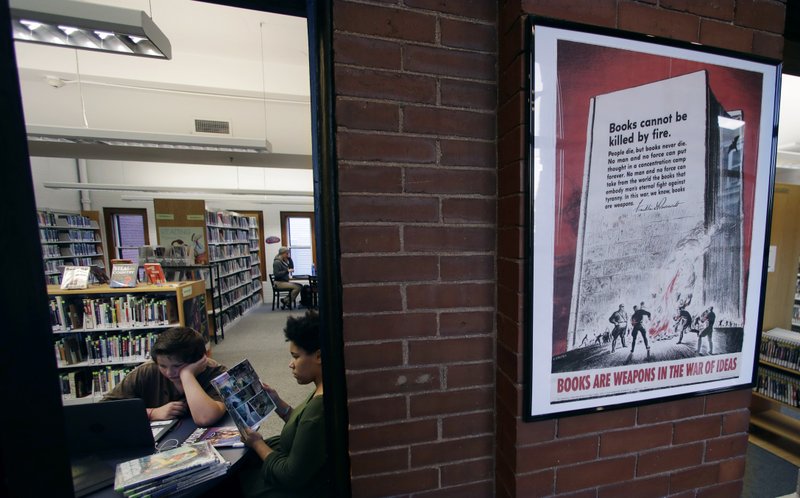
A 1942 Office of War Information poster copy hangs in a hallway of the Rochester Public Library in Rochester, New Hampshire, US Thursday. (Photo: AP)
One poster in a recently discovered trove vilifies the Nazis with a sword through a Bible and the words “This Is the Enemy.” Some encouraged self-sacrifice by promoting recycling, planting gardens and buying potatoes. Still others warned that loose lips can literally sink ships and get American soldiers killed.
This stash of 190 propaganda posters from World War I and World War II were found last year on top of two sawhorses in the basement of a Rochester, New Hampshire, library. Fragile but mostly in good condition, the posters offer viewers a glimpse of what life was like during war time and the extent that the American government went to maintain support for the conflict by playing on fear, patriotism and civic duty.
“Some of these are really neat,” library director Brian Sylvester said as he thumbed through the posters.
“Most of them were about supporting the military,” he said. “I would call that the main theme. Patriotism. Purchasing war bonds, growing a victory garden, being in support of rationing all that stuff. There is a neat one that has all these pictures of bombs and stuff. The way the artist drew it is there is a skillet at the top dumping out waste fat. That was used for munitions.”
Sylvester said it is unclear how the posters ended up in the library’s basement, but the themes give some clues that they were likely there for decades. About 50 posters dating back to World War I championed the American Red Cross, which kept its records at the library. Dozens more promoted war bonds, while two dozen highlighted a World War I program in which libraries collected books to be sent to troops overseas.
Many more look like big post cards, promoting tourist destinations in Britain or featuring a portrait of a soldier from an allied country — China, the Netherlands and even Ethiopia.
The best posters look like something painted by Norman Rockwell, with one for war bonds featuring children holding an American flag and another with a nurse watching over a soldier with his eyes bandaged and the words “Carry On.” On the flip side, a poster has darker images of Nazis burning books and the words “Books cannot be killed by fire.” Another plays on the enemy-in-our midst theme and features a soldier floundering at sea with the words “Someone talked.”
“The posters are almost a lost art form,” Sylvester said. “People don’t do this to try and spread this kind of message anymore. These are such simple messages. It’s just really laid on thick.”
Benjamin Weiss, director of collections at Boston’s Museum of Fine Arts who curated its current exhibit on 175 propaganda postcards from the 1920s, 1930s and 1940s, said certain themes stand out in these kinds of messages.
“Regardless the type of regime, the type of nation involved, propaganda is designed to rally people toward something and make people hate something,” he said. “It’s meant to divide the world into the people you want to be part of, the people who are opposed to you.”
Though he hadn’t heard about the New Hampshire posters, Weiss said they also illustrate the power of propaganda with a focus on national themes.
“That is a key piece of this which is they showed up in Rochester, New Hampshire but they could just as easily of been in Rochester, New York or Rochester, Minnesota,” he said. “These were things that were created, in most cases, probably at a central point with the idea they are going to reach the whole country and address the whole country.”
Sylvester said the library has no plans in the near future to display the posters. There are concerns that sunlight would cause the colors to fade. Instead, they have photographed all the posters and are showing them on a computer in the library. They are also planning to host an expert from the Wright Museum of World War II history for a Nov. 29 lecture on the power of war posters.
“For me personally, it kind of gave me an awareness that libraries played a role in those wars,” Sylvester said, adding they eventually hope to get the UV-protected glass and acid-free matting needed to display the original posters.


